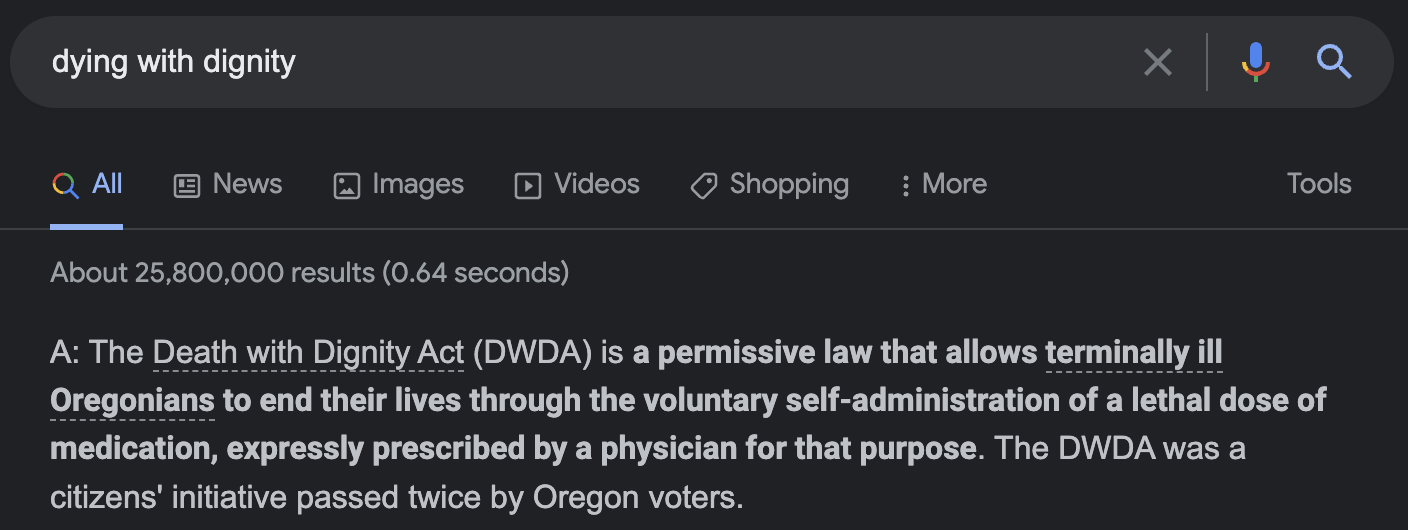Don’t die with dignity; instead play to your outs
You can also read this post on Lesswrong.
In MIRI announces new “Death With Dignity” strategy, Eliezer makes a number of claims. As I understood them, they are:
- Humanity is very likely doomed, because AI alignment is extremely hard, and no one has a strategy that could plausibly work (or is on track to find one)
- The right thing to do is maximize the log odds of humanity’s survival
- The way to do this is to adopt a mindset Eliezer calls “dying with dignity”
Assuming 1) and 2) are true, I’m not convinced the right mindset to adopt is “dying with dignity”. I don’t like it as a framing of the problem. Personally, it sounds demotivating and depressing, and not the thing that will help me maximize the log odds of success. I recognize that not everyone has the same mental setup as me, and some people might find the dying with dignity framing helpful. If it works for you, great, but I think there is a better problem framing that will work for a wider variety of mental setups, and I call it playing to your outs.
This problem framing arose out of a discussion about the dying with dignity post with Eli Rose and Seraphina Nix. Eli pointed out that in Magic the Gathering, there is a useful strategy to adopt when you’re likely to lose, called playing to your outs. Basically, there are times when you’re losing and it’s tempting to try to minimize your losses and make what gains you can. But if you’re sufficiently behind, this will almost always fail. Instead you need to think ahead to what cards you can draw, or what cards your opponent might fail to draw, that will afford you a chance to win. Then plan for one of those scenarios happening, even if it’s quite unlikely.
If 1) is true, then we are losing badly in our game of AI existential risk. It’s hard to stay motivated when things are dire, and I claim our stance should be like that of a good Magic player. Playing carefully, choosing strategies that have a shot at winning, keeping our eye on the prize. Being ready to win if the opportunity presents itself. I don’t think this is a different strategy than the one Eliezer is proposing; I think the strategy is identical. But I think there’s an important mindset difference, even if it’s just in the name, and that mindset difference matters.
I am not saying to condition upon some particular unlikely clever scheme working. The actual world is not a Magic game; it’s much more complex. So you can’t just wait for a particular card to come up in your deck. Playing to your outs might mean spending most of your time looking for outs, e.g. searching for alignment strategies that might work, trying to find extremely talented individuals who can do good research, or searching for AI governance strategies that might give us more time and reduce arms race dynamics. You have to identify a real potential out before you can play to it.
I think Eliezer proposes the dying with dignity framing in order to 1) stay motivated while 2) mitigating common epistemological errors when facing extremely bad odds. He writes:
When Earth’s prospects are that far underwater in the basement of the logistic success curve, it may be hard to feel motivated about continuing to fight, since doubling our chances of survival will only take them from 0% to 0%.
That’s why I would suggest reframing the problem - especially on an emotional level - to helping humanity die with dignity, or rather, since even this goal is realistically unattainable at this point, die with slightly more dignity than would otherwise be counterfactually obtained.
Obviously this is somewhat tongue in cheek, and possibly overstated for April 1st, but if it’s overstated I think it’s only slightly overstated given what else Eliezer has said about probability of doom. However, I think he’s serious in saying that motivation is important, and having a realistic goal can help aid motivation. The problem with dying with dignity as a motivational tool is that it centers dying, and the dignity doesn’t really hold any water next to the dying part, at least for me.
Even though Eliezer defines dying with dignity as optimizing log odds of success, it’s hard to get away from the normal connotations of the term. When I google “dying with dignity”, the first results are about terminally ill patients voluntarily ending their own lives. In the normal usage, dying with dignity is about accepting your death and not fighting the inevitable. I do not find this inspiring.

I find playing to your outs a lot more motivating. The framing doesn’t shy away from the fact that winning is unlikely. But the action is “playing” rather than “dying”. And the goal is “outs” rather than “dignity”. Again, I think the difference is in connotation and not actually strategy. To actually find outs, you have to search for solutions that might work, and stay focused on taking actions that improve our odds of success. When I imagine a Magic player playing to their outs, I imagine someone careful and engaged, not resigned. When I imagine someone dying with dignity, a terminally ill patient comes to mind. Peaceful, not panicking, but not fighting to survive.
I don’t think the following is a useful way to think for most people:
But if enough people can contribute enough bits of dignity like that, wouldn’t that mean we didn’t die at all? Yes, but again, don’t get your hopes up. Don’t focus your emotions on a goal you’re probably not going to obtain. Realistically, we find a handful of projects that contribute a few more bits of counterfactual dignity; get a bunch more not-specifically-expected bad news that makes the first-order object-level situation look even worse (where to second order, of course, the good Bayesians already knew that was how it would go); and then we all die.
Maybe this part is a joke, but it seems consistent with other things Eliezer has written recently. I’m not down with the death of hope. I think hope is a useful motivator, and I think it’s possible to maintain hope while still looking the hard grim probabilities in the face. I enjoy thinking about the glorious transhumanist future, and focusing my emotions on that goal helps me get up each morning to fight the good fight. I’ve detached my grimometer because it wasn’t helping me. Hope and long odds aren’t mutually exclusive.
I suspect the main reason Eliezer advocates dying with dignity is that he’s concerned if most people adopt a different stance they won’t be able to face the hard truths. He wants people to avoid the epistemic failure that comes from having to believe there is a reasonable way out. And I think that’s good!
Death with dignity means going on mentally living in the world you think is reality, even if it’s a sad reality, until the end; not abandoning your arts of seeking truth; dying with your commitment to reason intact.
I’m very pro this sentiment, but I think you can get it without death with dignity. A Magic player facing long odds knows they don’t win in most possible game states. They don’t delude themselves about that. But they keep playing. They keep watching for potential outs. And then when the game is over and they lose, then and only then do they stop trying to win. That’s how I want to orient.
Q&A
Q1: But wasn’t the Dying with Dignity post just a joke, since it was posted on April Fool’s Day?
A: I’ve heard Eliezer say basically all those things on days other than April 1st. He talks about dying with dignity a lot in the late 2021 MIRI conversations, see this doc for the specific mentions. Maybe “MIRI announces” was a joke, but most of the content was serious, I’m pretty sure.
Q2: But isn’t “playing to your outs” encouraging people to condition upon “comfortable improbabilities”?
A: I’m encouraging people not to do that, but that is a potential risk of this frame. No matter how you frame it, playing to win with really long odds is extremely hard. You need to find real outs in order to play to them. So if you don’t have any outs, the way to play to your outs is to start looking for outs, not going with the “closest best thing” and trying to make that work. I think there’s an important distinction between conditioning on “comfortable improbabilities” and “things that have to work in order to avoid extinction”. In my view, it seems likely that any viable success plan will involve several things that all need to go right. It seems legit to me to pick one of them on the critical path and start working on it, even if you think it’s quite unlikely the other elements of the plan will come together in time.
Q3: Okay, but isn’t “playing to your outs” encouraging people to do crazy or violent things?
A: No, most crazy or violent plans are really dumb and unlikely to work, for the reasons Eliezer outlines in his post. Playing to your outs doesn’t give you license to execute bad plans.
